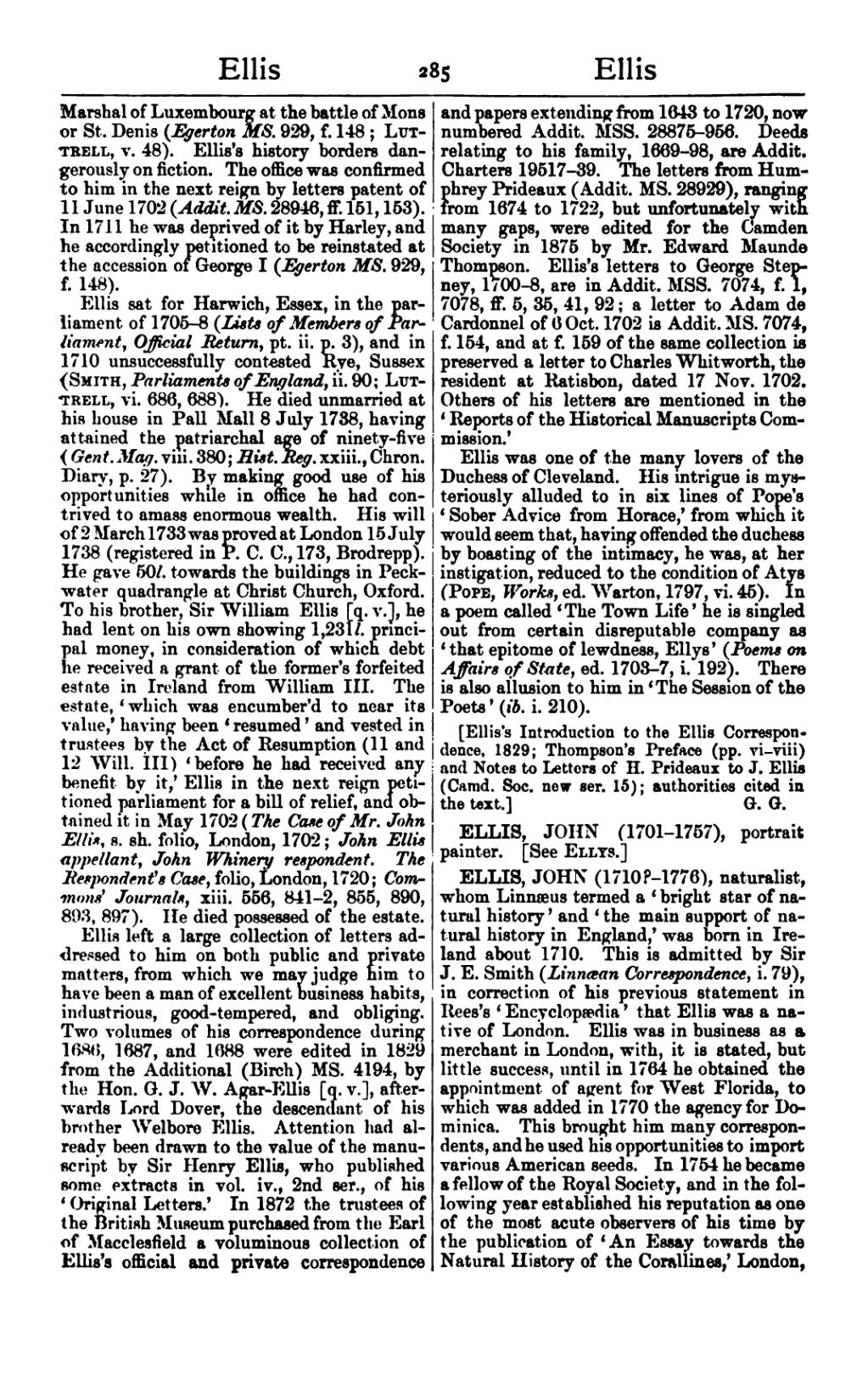Marshal of Luxembourg at the battle of Mons or St. Denis (Egerton MS. 929, f. 148; Luttrell, v. 48). Ellis's history borders dangerously on fiction. The office was confirmed to him in the next reign by letters patent of 11 June 1702 (Addit. MS. 28946, ff. 151, 153). In 1711 he was deprived of it by Harley, and he accordingly petitioned to be reinstated at the accession of George I (Egerton MS. 929, f. 148).
Ellis sat for Harwich, Essex, in the parliaments of 1702–5 and 1705–8 (Lists of Members of Parliament, pt. ii. p. 3), and in 1710 unsuccessfully contested Rye, Sussex (Smith, Parliaments of England, ii. 90; Luttrell, vi. 686, 688). He died unmarried at his house in Pall Mall 8 July 1738, having attained the patriarchal age of ninety-five (Gent. Mag. viii. 380; Hist. Reg. xxiii., Chron. Diary, p. 27). By making good use of his opportunities while in office he had contrived to amass enormous wealth. His will of 2 March 1733 was proved at London 15 July 1738 (registered in P. C. C., 173, Brodrepp). He gave 50l. towards the buildings in Peckwater quadrangle at Christ Church, Oxford. To his brother, Sir William Ellis [q. v.], he had lent on his own showing 1,231l. principal money, in consideration of which debt he received a grant of the former's forfeited estate in Ireland from William III. The estate, ‘which was encumber'd to near its value,’ having been ‘resumed’ and vested in trustees by the Act of Resumption (11 and 12 Will. III) ‘before he had received any benefit by it,’ Ellis in the next reign petitioned parliament for a bill of relief, and obtained it in May 1702 (The Case of Mr. John Ellis, s. sh. folio, London, 1702; John Ellis appellant, John Whinery respondent. The Respondent's Case, folio, London, 1720; Commons' Journals, xiii. 556, 841–2, 855, 890, 893, 897). He died possessed of the estate.
Ellis left a large collection of letters addressed to him on both public and private matters, from which we may judge him to have been a man of excellent business habits, industrious, good-tempered, and obliging. Two volumes of his correspondence during 1686, 1687, and 1688 were edited in 1829 from the Additional (Birch) MS. 4194, by the Hon. G. J. W. Agar-Ellis [q. v.], afterwards Lord Dover, the descendant of his brother Welbore Ellis. Attention had already been drawn to the value of the manuscript by Sir Henry Ellis, who published some extracts in vol. iv., 2nd ser., of his ‘Original Letters.’ In 1872 the trustees of the British Museum purchased from the Earl of Macclesfield a voluminous collection of Ellis's official and private correspondence and papers extending from 1643 to 1720, now numbered Addit. MSS. 28875–956. Deeds relating to his family, 1669–98, are Addit. Charters 19517–39. The letters from Humphrey Prideaux (Addit. MS. 28929), ranging from 1674 to 1722, but unfortunately with many gaps, were edited for the Camden Society in 1875 by Sir Edward Maunde Thompson. Ellis's letters to George Stepney, 1700–8, are in Addit. MSS. 7074, f. 1, 7078, ff. 5, 35, 41, 92; a letter to Adam de Cardonnel of 6 Oct. 1702 is Addit. MS. 7074, f. 154, and at f. 159 of the same collection is preserved a letter to Charles Whitworth, the resident at Ratisbon, dated 17 Nov. 1702. Others of his letters are mentioned in the ‘Reports of the Historical Manuscripts Commission.’
Ellis was one of the many lovers of the Duchess of Cleveland. His intrigue is mysteriously alluded to in six lines of Pope's ‘Sober Advice from Horace,’ from which it would seem that, having offended the duchess by boasting of the intimacy, he was, at her instigation, reduced to the condition of Atys (Pope, Works, ed. Warton, 1797, vi. 45). In a poem called ‘The Town Life’ he is singled out from certain disreputable company as ‘that epitome of lewdness, Ellys’ (Poems on Affairs of State, ed. 1703–7, i. 192). There is also allusion to him in ‘The Session of the Poets’ (ib. i. 210).
[Ellis's Introduction to the Ellis Correspondence, 1829; Thompson's Preface (pp. vi–viii) and Notes to Letters of H. Prideaux to J. Ellis (Camd. Soc. new ser. 15); authorities cited in the text.]
ELLIS, JOHN (1701–1757), portrait painter. [See Ellys.]
ELLIS, JOHN (1710?–1776), naturalist, whom Linnæus termed a 'bright star of natural history' and 'the main support of natural history in England,' was born in Ireland about 1710. This is admitted by Sir J. E. Smith (Linnæan Correspondence, i. 79), in correction of his previous statement in Rees's 'Encyclopædia' that Ellis was a native of London. Ellis was in business as a merchant in London, with, it is stated, but little success, until in 1764 he obtained the appointment of agent for West Florida, to which was added in 1770 the agency for Dominica. This brought him many correspondents, and he used his opportunities to import various American seeds. In 1754 he became a fellow of the Royal Society, and in the following year established his reputation as one of the most acute observers of his time by the publication of 'An Essay towards the Natural History of the Corallines,' London,
